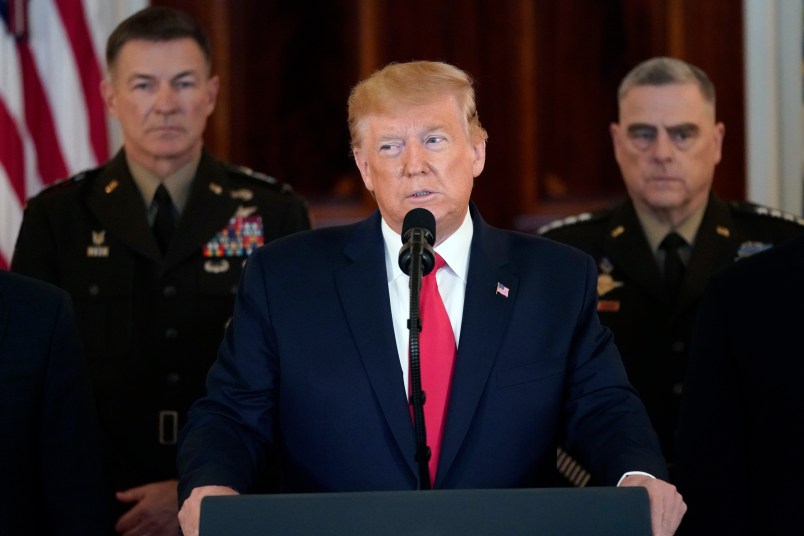President Donald Trump essentially blamed his predecessor on Wednesday for funding the missiles that hit American military bases Tuesday night, but military and diplomatic experts told TPM the claim is ridiculous.
“The missiles fired last night at us and our allies were paid for by the funds made available by the last administration,” Trump said Wednesday morning, flanked by military brass and the vice president, secretary of state and secretary of defense. His 2020 reelection campaign boosted the attack.
It was a reference to the Iran nuclear deal — the Joint Comprehensive Plan of Action — that the United States and five other countries negotiated with the Iranians during the Obama administration. Among other things, the deal unfroze billons in Iranian money that had been stranded overseas as a result of international sanctions on Iran. In exchange, Iran set strict limits on its nuclear program.
Multiple experts told TPM that Trump’s statement was plainly false, and still others pointed out that the types of missiles said to have been used in the strikes Tuesday, the Fateh-110 and Qiam-1, have been produced for years — well before the talks preceding the Iran deal even began.
The precision-guided missiles were “already a prime focus back then,” said Fabian Hinz, a research associate at the James Martin Center for Nonproliferation Studies.
“Iran developed the Qiam missile that was used last night in 2010-11,” added Ali Vaez, International Crisis Group’s Iran project director and an adjunct professor at Georgetown. He emphasized that Trump’s claim was “totally false!”
“It takes years to develop ballistic missiles, and Iran had a large arsenal of them long before the agreement,” noted Benjamin H. Friedman, policy director at Defense Priorities.
Obama administration officials did acknowledge at the time that some of the Iranian money unfrozen by the Iran deal could end up funding the Iranian military.
“I think that some of it will end up in the hands of the [Islamic Revolutionary Guards Corps] or of other entities, some of which are labeled terrorists,” then-Secretary of State John Kerry told CNBC in January 2016.
But by May 2017, the then-director of the Defense Intelligence Agency, Vincent Stewart, testified that while “some” of the money the agreement had made available ended up in Iran’s military, “the preponderance of the money [has] gone to economic development and infrastructure.”
Trump announced in May 2018 that the U.S. would withdraw from the deal, despite his administration repeatedly affirming that Iran was complying with its terms.
“Iran’s fundamental national security policies have not changed since the JCPOA,” Sina Toossi, a senior research analyst at the National Iranian American Council, said. “Nor was most of the supposed economic ‘windfall’ Iran got from that deal spent on defense and its regional intervention.”
Professor Jeffrey Lewis, a nonproliferation expert at the Middlebury Institute of International Studies, put it more bluntly Wednesday.
“There is no truth to [Trump’s] statement whatsoever,” he said. “You could say the same thing about sales tax on a soft drink one purchased in Tehran.”
Trump on Wednesday also misstated, again, the amount of Iranian money the Iran deal had freed up, saying that Iran was “given $150 billion” as part of the deal. The actual sum Iran recovered is closer to $50 billion or less, according to officials from both Iran and the United States.
The White House did not respond to TPM’s request for comment.
Obama’s national security adviser, Susan Rice, said on MSNBC Wednesday that Trump’s claim was another in a “series of despicable lies.”
That Trump remained “obsessed” with Obama three years after taking office, she said, “shows President’s Trump’s extreme weakness and insecurity.”



